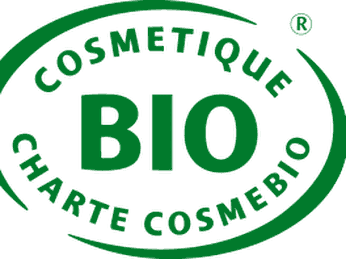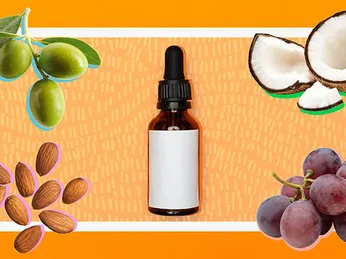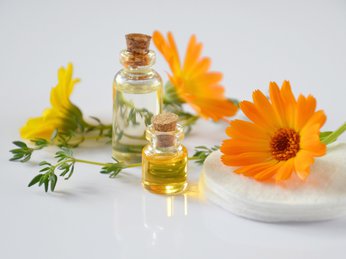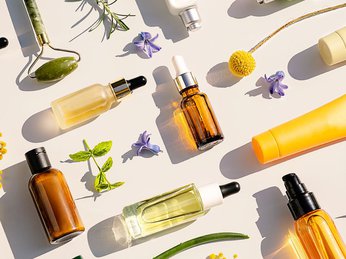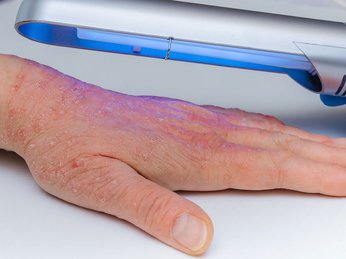Hyaluronic acid : definition and benefits
If there’s one skin-care ingredient that puts you in the fast lane to hydrated skin, it’s hyaluronic acid. You’ll find it as an active ingredient in seemingly every skin-care product category under the sun — serums, cleansers, moisturizers, and more. There’s a reason it’s ubiquitous: Not only does hyaluronic acid do a killer job when it comes to moisturizing the skin, but it minimizes signs of aging, since plump, hydrated skin makes fine lines and wrinkles less visible.
Here’s a scientific guide that touches on the basics of hyaluronic acid.
What Is Hyaluronic Acid?
Technically, it’s a group of sugar molecules called polysaccharides, according to a past study. These molecules work to cushion and lubricate, and they’re found naturally in the body’s connective tissues, notes the Cleveland Clinic.
Over time, your body’s stores of hyaluronic acid decline. Age is one reason, research shows, but environmental factors — such as smoking and air pollution — also accelerate this process, according to another past study. That’s the bad news.
The good news is that topical products that feature hyaluronic acid, whether as part of the ingredients list in a moisturizer or as the star of a serum, can help rebuild those depleted stores, says Bonnie Gasquet, MD, an internal medicine physician at Studio Health medical center in Belle Chasse, Louisiana.
“Hyaluronic acid attracts and binds to water molecules and increases the water content of the skin,” says Shari Marchbein, MD, a board-certified dermatologist in private practice in New York City. It can absorb more than 1,000 times its weight in water, Dr. Marchbein says.
What Are the Benefits of Hyaluronic Acid?
The key benefit of hyaluronic acid is hydration and that unbelievable ability to retain moisture. To understand how important moisture is for the skin, you have to first know that dehydrated skin — when the top layer of skin doesn’t have enough water — appears dry, rough, and flaky, Marchbein says.
It’s not just a matter of aesthetics. Dry skin can be dangerous. “Poorly hydrated skin is unable to maintain an appropriately intact skin barrier, leaving the skin more vulnerable to damage from external and environmental sources,” Marchbein says. When the skin barrier is not intact, it can let bacteria in, which can lead to infection, according to a study in BMC Research Notes. Compromised skin barriers can play a role in many skin conditions, including dry skin, atopic dermatitis, rosacea, and acne, according to a study in the Journal of Allergy & Therapy.
Hydrated skin, then, is what you want. “Skin hydration is important because hydrated skin looks more plump, healthier, and more vibrant,” Marchbein says. And younger, too, if that’s one of your goals. According to some research, skin aging is associated with loss of skin moisture, and hyaluronic acid is the key ingredient when it comes to combating or reversing these signs. “Because of its water-pulling qualities, hyaluronic acid can refine and age-rewind in those dry, sunken, or ‘crepe’ areas,” Dr. Gasquet says. A small study published in May 2016 in MMW Fortschritte der Medizin found that over-the-counter anti-wrinkle creams containing hyaluronic acid decreased the depth of wrinkles around the lips and eyes by 10 to 20 percent over a three-month period. Skin tightness also improved by 13 to 30 percent.
The 3 Types of Hyaluronic Acid: How They Differ
There are three types of hyaluronic acid:
- Hydrolyzed hyaluronic acid is hyaluronic acid that has been broken down into elements small enough to penetrate the skin, Gasquet says. It’s moisturizing, but not the most moisturizing option, so it’s best for people who have oily or combination skin, since these skin types want to avoid over-moisturizing.
- Sodium hyaluronate goes deeper into the skin and delivers even better results, though the effects aren’t very long lasting, Gasquet says. “Sodium hyaluronate is best for people who have normal skin, because it will allow moisture to seep in, but you don’t really need a heavy-duty, long-lasting effect.” This is the ingredient you’ll likely find in serums.
- Sodium acetylated hyaluronate has the benefits of sodium hyaluronate but with longer-lasting results. It’s best for people who need moisture, such as those with dry skin, those who live in dry climates, or those looking for a product for the dry winter months.
There’s also ingestible hyaluronic acid, which is a capsule filled with the active ingredient. The idea is that by taking a supplement, levels of the hyaluronic acid will be steady and the effects will last, according to a study published in July 2017 in Clinical, Cosmetic and Investigational Dermatology. And it appears to work: The researchers found that participants who took 120 milligrams of hyaluronic acid per day for 12 weeks improved their skin wrinkles and their overall skin condition.
Gasquet recommends applying products with hyaluronic acid during the winter especially, when the skin tends to be at its driest. But even those who aren’t battling dryness will want to add hyaluronic acid to their skin-care routine. Kenneth Rothaus, MD, a board-certified plastic surgeon with Rothaus Plastic Surgery in New York City, says it’s responsible for giving the skin a healthy glow. Marchbein recommends a hyaluronic-packed moisturizer for people of all ages. “It is never too early to start a good skin-care routine,” she says.


